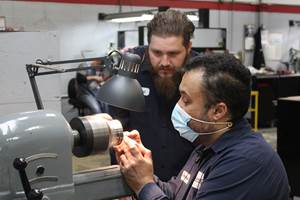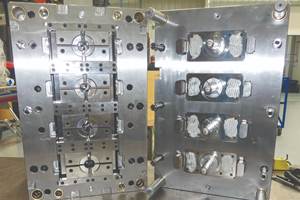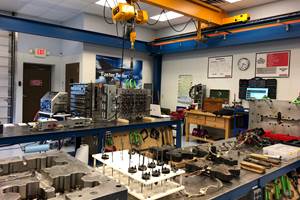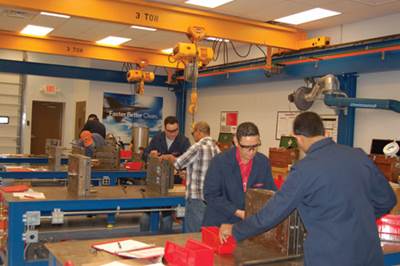How to Ensure Quick, Correct Mold Maintenance
Regular cleaning and proper maintenance are key to sustaining the life of a mold.
Regular cleaning and proper maintenance are key to sustaining the life of a mold. If preventative maintenance procedures are consistently and correctly performed, they lower the cost of ownership and increase production quality: a win-win scenario for the manufacturer and the customer.
While incredibly important, maintenance and cleaning are also tedious and require precise attention to detail. No one really gets excited about doing them. So, in a busy shop where customers demand quick turnarounds, preventative maintenance often gets pushed to the back burner. After all, it’s a time-consuming job. It takes a careful, patient and knowledgeable hand to complete the process correctly.
And mistakes are costly. At best, shoddy maintenance or neglected cleaning can lead to defects that need to be tooled out; at worst, it can put a mold into early retirement.
Knowledge is the best remedy, but knowledgeable experts aren’t usually the ones performing maintenance procedures. They simply don’t have the time. It can take hours to clean a mold properly. The more complex the mold, the longer the procedure takes. So, the job gets farmed out.
But the stakes are high. In its lifetime, a single mold can make millions of products, and the longer it sits on the bench waiting for repairs and cleaning, the longer the entire production line is held up. Time really is money. So, the critical question remains: how do you ensure that cleaning and maintenance gets done on schedule, quickly and correctly—even when you’re not around to oversee the process?
Choosing the right documentation software may prove essential in helping moldmakers collaborate while promoting the principles autonomous maintenance. The right software can help companies develop visual, step-by-step process documentation (procedures that include diagrams, color photos and videos), which enables shops to establish a set of standardized instructions for everything from mold cleaning and repair to safety procedures.
As you know, when it comes to maintenance, the details are critical. The wrong abrasive or tool can damage molds and plates, so the right documentation software should allow shop managers to list which specific tools to use, what cleaning agents to apply, how difficult the procedure is and how long completing the procedure correctly should take.
The right software won't just aid in the documentation, it can also be the foundation of a shop-wide communication system—a way to distribute expertise from master to journeyman. Even when experts are tied up on other tasks, their insights can still be referenced by less-experienced workers. You don’t need to look over someone’s shoulder to explain exactly the right way to do a job. The system should handle that for you.
Write the instructions once—exactly the way you want them—and deploy them to everyone around the shop. Instructions shouldn't be limited to a few desktop computers or a handful of printouts as is often the case. Instead, the documentation system should be able to deploy the relevant information instantly to mobile devices (Tablets and phones, for example), enabling your process documentation to be everywhere your people need it.
Knowledge is power. With the right documentation solution in place, moldmakers can build a collaborative archive of expert knowledge that everyone can rely on; and, that keeps your shop running smoothly, safely and profitably.
Contributor:
Eric Craig Doster is Market Development Manager for Dozuki.
For More Information:
Dozuki / eric@dozuki.com
(805) 316-0880 / dozuki.com
Related Content
How to Use Scientific Maintenance for More Accurate Mold and Part Troubleshooting
Discover how adopting scientific maintenance approaches helps improve mold lifespan, minimize failures, and optimize production outcomes.
Read MoreQuestions and Considerations Before Sending Your Mold Out for Service
Communication is essential for proper polishing, hot runner manifold cleaning, mold repair, laser engraving and laser welding services.
Read MorePrecision Welding Services Offer Rapid Turnaround Mold Repair and Reduced Molder Downtime
X-Cell Tool & Mold relies on outsourced, high-quality welding repairs from Lewis-Bawol Welding to ensure its customers' molds are back in production quickly and affordably.
Read MoreWhat You Need to Know About Hot Runner Systems and How to Optimize Their Performance
How to make the most out of the hot runner design, function and performance.
Read MoreRead Next
Five Principles that Drive Mold Maintenance Efficiency
Individuals from companies that have embraced systemized mold maintenance share their stories.
Read MoreHow to Use Continuing Education to Remain Competitive in Moldmaking
Continued training helps moldmakers make tooling decisions and properly use the latest cutting tool to efficiently machine high-quality molds.
Read MoreReasons to Use Fiber Lasers for Mold Cleaning
Fiber lasers offer a simplicity, speed, control and portability, minimizing mold cleaning risks.
Read More



















